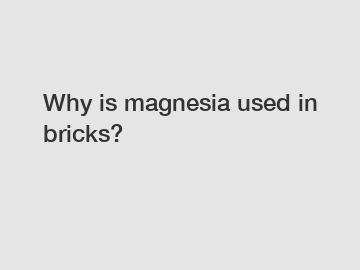Why is magnesia used in bricks?
Why is Magnesia Used in Bricks?
When it comes to constructing buildings, bricks have been a primary choice for centuries. These versatile construction materials offer durability, strength, and insulation properties. To enhance the quality of bricks, various additives and materials are used during the manufacturing process. One such substance is magnesia. Magnesia, also known as magnesium oxide (MgO), is commonly used in the production of bricks. In this article, we will explore the reasons behind the use of magnesia in bricks and its benefits.
Understanding Magnesia:

Magnesia is a white, powdery substance that is obtained from magnesium-rich minerals. It is widely used in various industries due to its excellent fire-resistant properties. When added to bricks, magnesia plays a crucial role in enhancing their strength and durability. Let's delve into the specific reasons why magnesia is used in bricks.
1. Fire Resistance:
One of the significant advantages of using magnesia in bricks is its exceptional fire resistance. Magnesia has a high melting point of around 2,800 degrees Celsius, making it an ideal choice for fireproof applications. By incorporating magnesia into the composition of bricks, it significantly increases their capability to withstand high temperatures, protecting the structure from fire hazards.
2. Heat Insulation:
In addition to its fire resistance, magnesia also acts as an excellent heat insulator. Bricks made with magnesia have a lower thermal conductivity compared to traditional bricks. This means that they can effectively trap and retain heat, making them highly suitable for applications that require insulation such as kilns, furnaces, and industrial ovens.
3. Improved Strength:
Magnesia-infused bricks offer enhanced strength and durability compared to regular bricks. When magnesia reacts with water during the brick formation process, it forms magnesium hydroxide. This compound acts as a binder, binding the brick particles together more effectively. As a result, the bricks become stronger and less prone to crumbling or flaking, ensuring better overall structural integrity.
4. Resistance to Chemical Attacks:
Magnesia is known for its resistance to chemicals and various corrosive substances. By incorporating magnesia into bricks, it prevents the penetration of harmful chemicals, acids, and other corrosive materials. This makes magnesia bricks highly suitable for industrial applications where exposure to corrosive environments is common, such as chemical plants and battery manufacturing facilities.
Closing Paragraph:
In conclusion, the versatile properties of magnesia make it an excellent additive for bricks. Magnesia enhances the fire resistance, heat insulation, strength, and resistance to chemical attacks of bricks. As a result, buildings constructed with magnesia-infused bricks offer improved safety, durability, and longevity. If you are looking for high-quality bricks that incorporate magnesia, contact us today. Our team of experts will guide you in choosing the right magnesia-infused bricks for your construction projects.
Contact Us:
If you have any inquiries regarding magnesia bricks or require assistance in choosing the right construction materials, please feel free to contact us at [Contact Information]. Our dedicated team will be happy to assist you.
Want more information on ceramic fibre blanket dealer, ceramic fibre blanket dealer, refractory mortar? Feel free to contact us.


